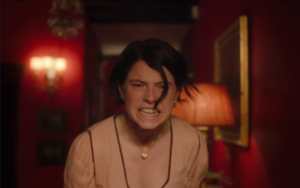MEN: 3 STARS. “You can’t spell ‘menacing’ without the word ‘men.’”
 You can’t spell “menacing” without the word “men.”
You can’t spell “menacing” without the word “men.”
The new Jessie Buckley psychological thriller, now playing in theatres, takes a look at toxic relationships and gender politics through the lens of British folk horror and surreal body terror.
Buckley is Harper, a young widow smarting from the death of her husband James (Pappa Essiedu) by suicide. To heal her soul, she rents a 500-year-old house in the English countryside. Miles from anywhere—“The pub is ten minutes down the road,” says her socially awkward landlord Geoffrey (Rory Kinnear), “thirty minutes on the way back.”—the tranquil surroundings should be a balm, but she is haunted by visions of the last moments she spent with her controlling, abusive husband.
On the verge of a divorce he didn’t want, they argued. “I’ll kill myself,” he says, “and you’ll have to live with my death. That’s not a threat, it’s a warning.”
Minutes later, he plunges to his death, changing Harper’s life forever.
At the rental house Harper has a close call with a scarred, bloodied and naked man she thinks is stalking her. The local police assure her she is not in danger, and yet unsettling things continue to happen, including a run in with a rude boy in a Marilyn Monroe mask, microaggressions, stand-offish men in town and the world’s most unhelpful vicar, whose advice is not exactly welcome.
The trip to the country culminates in a hallucinogenic sequence that combines body horror (the kind that might make David Cronenberg envious), British folk horror, pagan imagery and even some stunt driving.
“Men” feels like two movies. The first half is a domestic drama, a divorce turned ugly, played out in flashbacks. The idyll of the country retreat, featuring long dialogue-free sequences, is briefly interrupted by memories and some rather creepy men. It is uncomfortable but earthbound.
The second part, which makes up the film’s last third, is a grotesque, surreal psychological thriller with images best seen after you’ve finished your popcorn and Twizzlers. Director and writer Alex Garland gruesomely and memorably (perhaps a little too memorably) illustrates a never-ending cycle of male rebirth into crisis and toxicity. It’s never clear where the metaphor starts or ends and the head trip begins, but the message of menacing toxic masculinity is made bloody clear (literally).
Both sides of the story have interesting moments, most courtesy of Buckley, the rare effortless performer whose face contains multitudes, but despite some memorable flourishes, they don’t feel like a whole. It’s like there is a puzzle piece missing in the storytelling. As a result, “Men” is interesting, but isn’t exactly an effective genre film or study of trauma.
